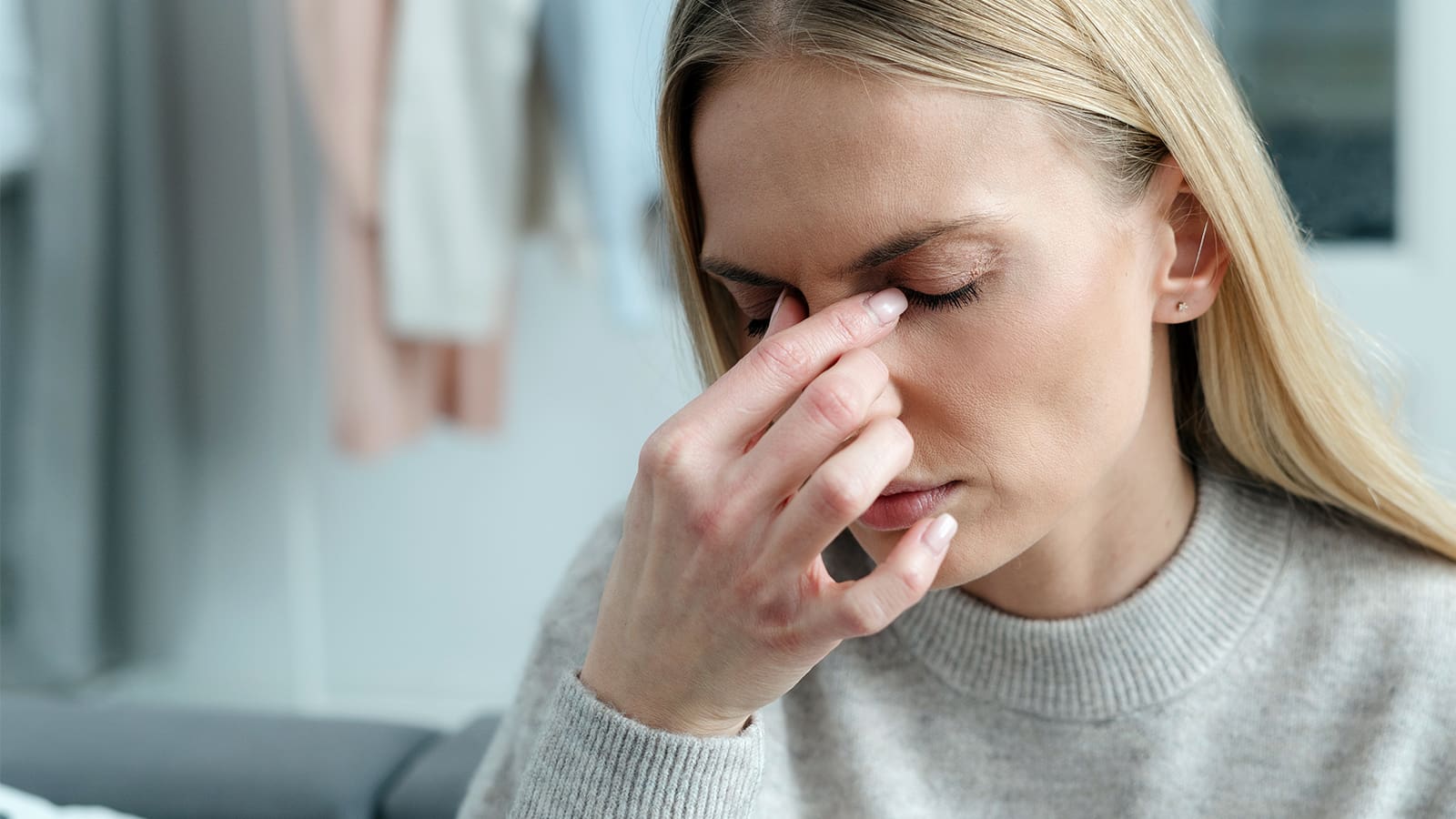Reviewed By Blake Gilliam, CRNP
Reading Time: 4 minutes
Allergies do more than cause annoying symptoms like a runny nose or itchy eyes.
They can also sap your energy and leave you feeling exhausted. If you are constantly feeling tired, you might be wondering: Can allergies make you sleepy or cause fatigue? Absolutely!
Here is why it happens and what you can do about it.
Table of Contents
Key Takeaway
If you are constantly tired or battling allergy fatigue, your symptoms may be linked to allergic reactions. Identifying triggers and using effective treatments like sublingual allergy drops or lifestyle changes can help restore your energy and improve your daily life.
How Allergies Impact Energy Levels
Allergies trigger a chain reaction in your body.
When you encounter an allergen like pollen, dust mites, or pet dander, your immune system sees these harmless substances as threats. In response, it releases chemicals like histamine to fight them off.
This immune response leads to allergic reactions, which can include fatigue, brain fog, and poor sleep quality.
Common Allergens That Drain Your Energy
Allergens can significantly affect your daily energy, whether they come from the environment, your home, or the food you eat.
- Outdoor allergens: Tree pollen, grass pollen, and ragweed pollen during seasonal allergies.
- Indoor allergens: Dust mites, mold, and animal dander.
- Food allergies: Reactions to common foods like dairy, gluten, and nuts.
Why Allergy Symptoms Lead to Fatigue
When your body is constantly battling allergens, it diverts energy to the immune system, leaving you feeling drained.
- Nasal congestion and postnasal drip disrupt nighttime sleep, making it hard to reach deep sleep.
- Allergic rhinitis causes inflammation, leading to persistent tiredness.
- The body’s constant immune response to allergy triggers drains your energy levels.
- Allergy medications, especially first-generation antihistamines, can cause drowsiness.
Key Symptoms of Allergy-Related Fatigue
Fatigue related to allergies can present through various symptoms that affect your mental clarity and daily productivity.
- Daytime sleepiness and a constant sense of tiredness.
- Brain fog makes concentration difficult.
- Poor sleep quality due to nasal congestion or other allergy symptoms.
- Headaches or sinus pressure adding to fatigue.
Types of Allergies That Affect Sleep and Energy
Certain allergies do more than cause physical discomfort—they directly interfere with sleep and drain your energy levels.
1. Seasonal allergies: High pollen count during spring and fall can cause congestion, postnasal drip, and sleep disruption.
2. Indoor allergies: Pet dander, mold, and dust mites are common in homes, especially during colder months when windows stay closed.
3. Food allergies: Reactions to foods like dairy, gluten, or nuts can cause inflammation and chronic fatigue.
4. Chronic allergies: Persistent allergic responses to common allergens can lead to long-term fatigue, impacting your daily life.
Learn more: Are Allergies Genetic? The Answer May Surprise You
How to Fix Allergy Fatigue
Here are some practical steps you can take to find relief.
Step 1: Identify the Allergy Trigger
At Madison Integrative Medicine, we offer comprehensive testing to identify allergy triggers.
- IgG food allergy testing: This test identifies your body’s reaction to specific foods by measuring your IgG antibody levels. It is ideal for diagnosing delayed food sensitivities that cause fatigue from allergies.
- Skin testing for environmental allergens: We test for pollen, animal dander, dust mites, and more. The results show if you have allergic responses to common allergens.
Step 2: Develop a Treatment Plan
Once the trigger is identified, treatment options include:
- Sublingual allergy drops: Convenient and safe, these drops work similarly to allergy shots by gradually desensitizing the immune system to allergens.
- Nasal sprays: Options like nasal steroid spray or saline nasal spray help clear nasal passages and reduce congestion.
- Non-drowsy antihistamines: These can provide relief without causing drowsiness.
- Air purifiers: Reducing the amount of airborne allergens in your home can minimize symptoms.
Long-Term Solutions for Allergy Fatigue
For long-term relief, consider allergen immunotherapy, which retrains your immune system to respond less aggressively to triggers.
Our sublingual allergy drops provide a practical, at-home alternative to traditional allergy shots.
Lifestyle Tips to Manage Allergy Fatigue
Simple lifestyle changes can help you regain energy by reducing exposure to allergens and improving sleep quality.
- Maintain a consistent sleep schedule: This can improve sleep quality and help restore energy levels.
- Use a neti pot or saline rinse: Clear out nasal passages to prevent sleep disruption.
- Limit exposure to allergens: Monitor the pollen count, and use air purifiers or protective bedding for indoor allergens.
- Stay hydrated: Proper hydration can help reduce sinus pressure and fatigue.
Choose Madison Integrative Medicine for Allergy Relief
We take a holistic approach to addressing allergies.
Our team will work with you to develop a customized treatment plan that fits your needs. Whether you need allergy testing, dietary adjustments, or ongoing therapy, we are here to help you regain your energy and improve your quality of life.
To book an appointment at our wellness center in Madison, AL, call (256) 325-0955 or visit us at 1230 Slaughter Rd Suite C, Madison, Alabama.
FAQs
Can allergies make you sleepy?
Yes, allergies can make you feel sleepy due to the immune response, nasal congestion, and the use of certain medications like first-generation antihistamines. Additionally, poor sleep quality caused by a stuffy nose can lead to daytime fatigue.
Can allergies cause fatigue?
Yes, allergy fatigue is common. The body’s constant battle against allergens drains energy, especially during allergy flare-ups or periods of high pollen count.
How to fix allergy fatigue?
Start by identifying your allergy triggers through testing. Then, follow a personalized treatment plan that may include sublingual drops, nasal sprays, or allergy medications. Lifestyle adjustments like using air purifiers and maintaining proper sleep hygiene also help.

